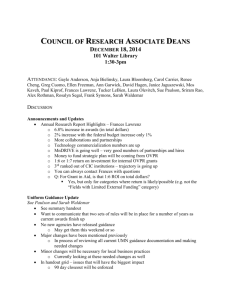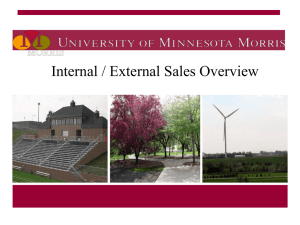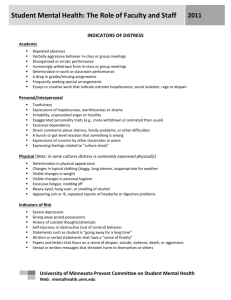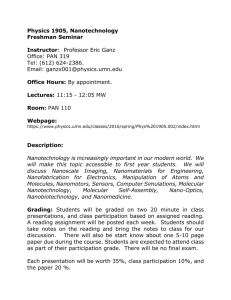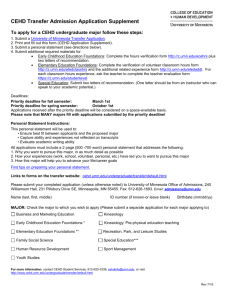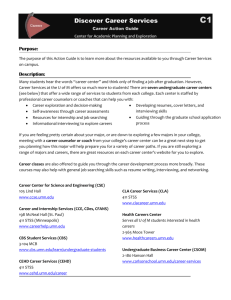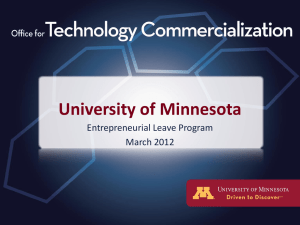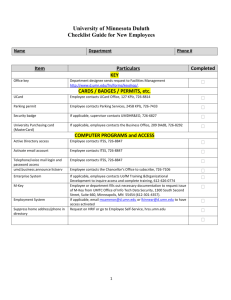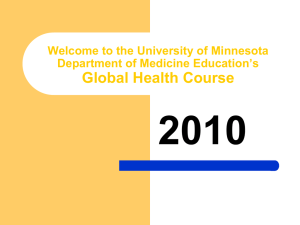Advising Guide for Residents and Fellows
advertisement
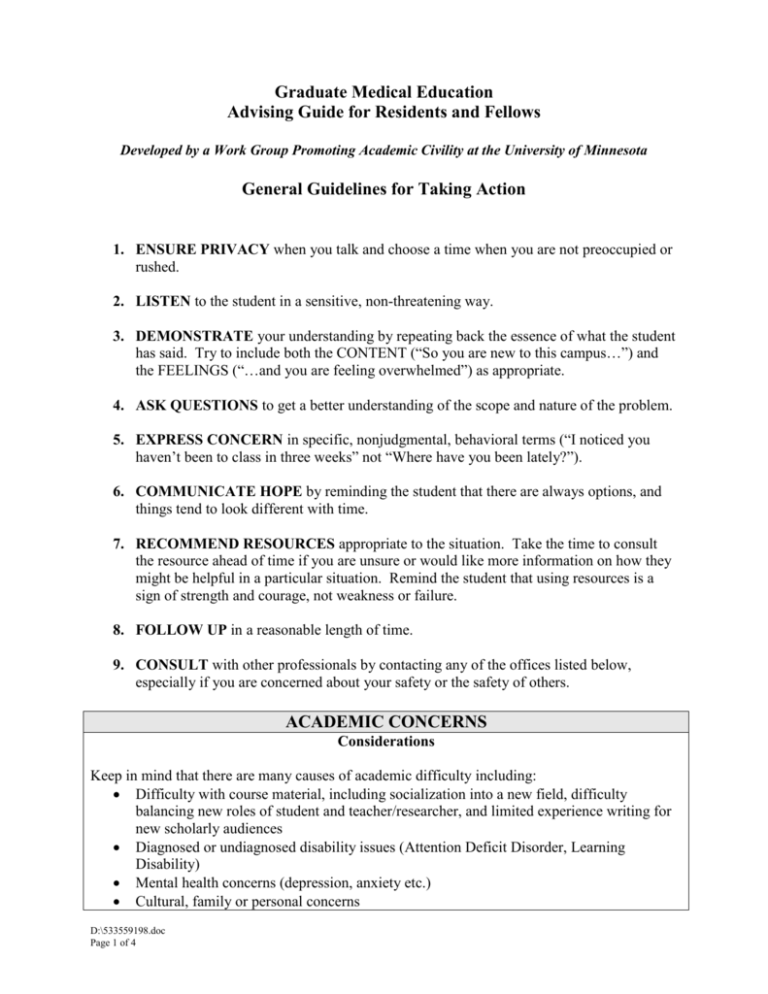
Graduate Medical Education Advising Guide for Residents and Fellows Developed by a Work Group Promoting Academic Civility at the University of Minnesota General Guidelines for Taking Action 1. ENSURE PRIVACY when you talk and choose a time when you are not preoccupied or rushed. 2. LISTEN to the student in a sensitive, non-threatening way. 3. DEMONSTRATE your understanding by repeating back the essence of what the student has said. Try to include both the CONTENT (“So you are new to this campus…”) and the FEELINGS (“…and you are feeling overwhelmed”) as appropriate. 4. ASK QUESTIONS to get a better understanding of the scope and nature of the problem. 5. EXPRESS CONCERN in specific, nonjudgmental, behavioral terms (“I noticed you haven’t been to class in three weeks” not “Where have you been lately?”). 6. COMMUNICATE HOPE by reminding the student that there are always options, and things tend to look different with time. 7. RECOMMEND RESOURCES appropriate to the situation. Take the time to consult the resource ahead of time if you are unsure or would like more information on how they might be helpful in a particular situation. Remind the student that using resources is a sign of strength and courage, not weakness or failure. 8. FOLLOW UP in a reasonable length of time. 9. CONSULT with other professionals by contacting any of the offices listed below, especially if you are concerned about your safety or the safety of others. ACADEMIC CONCERNS Considerations Keep in mind that there are many causes of academic difficulty including: Difficulty with course material, including socialization into a new field, difficulty balancing new roles of student and teacher/researcher, and limited experience writing for new scholarly audiences Diagnosed or undiagnosed disability issues (Attention Deficit Disorder, Learning Disability) Mental health concerns (depression, anxiety etc.) Cultural, family or personal concerns D:\533559198.doc Page 1 of 4 Many students appreciate an instructor taking the initiative to express concern about their academic performance. Faculty may be able to help a student with content-related difficulty, or may wish to refer to the resources below for these and other concerns. Resources Marilyn Becker, PhD LP. The Medical School Director of Learner Development. Dr. Becker assists residents and fellows with learning/performance concerns across the GME competencies and residency/fellowship requirements; provides assessments and referrals for special services [disability evaluation, ESL tutoring, personal/couple counseling, health/wellness assistance]; and is available for consultation on academic/training process difficulties. You can contact her by phone at 612-626-7196, by email becke024@umn.edu, or in person B624Mayo. Mary Tate. The Director of the Medical School Office of Minority Affairs and Diversity is the Equal Opportunity and Affirmative Action liaison. For questions or concerns regarding matters of allegations of mistreatment, sexual harassment, or discrimination, the Office of Minority Affairs and Diversity may assist in finding solutions. You can contact her by phone 612-625-1494, by email tatex001@umn.edu, or in person B608 Mayo. Resident Assistance Program (RAP). The Resident Assistance Program (RAP) is a confidential counseling service designed to offer residents and their immediate family members a professional, external resource to address a variety of stressors, at no cost to the client. In many cases, these stressors are affecting personal lives and impacting a resident’s ability to meet professional expectations in the workplace. You can contact them by phone 651-430-3383 (local) OR 1-800-632-7643 (toll free); or the web www.sandcreekeap.com. Student Conflict Resolution Center 211 Eddy Hall Phone: 624-SCRC (7272) http://www.sos.umn.edu/ International Student and Scholar Services 190 HHH Center Phone: 612-626-7100 http://www.isss.umn.edu/ Disability Services Suite 180 McNamara Alumni Center Phone: 612-626-1333 http://ds.umn.edu/ PERSONAL CONCERNS Considerations Be CLEAR about what you can and cannot do RESPECT the student's value system and culture Bear in mind… Resist the temptation to be a hero or savior Recognize the limits of your role and refer to other professionals when needed. Refrain from making promises you cannot or may not be able to keep. If the student or others are in danger, you will need to act; so be cautious about promises of confidentiality. D:\533559198.doc Page 2 of 4 Doing something in response to a student’s concerns is almost always better than doing nothing. Students may be in a new and potentially disorienting day-to-day cultural context while some students also feel disconnected from their normal social supports. Resources Marilyn Becker, PhD LP. The Medical School Director of Learner Development. Dr. Becker assists residents and fellows with learning/performance concerns across the GME competencies and residency/fellowship requirements; provides assessments and referrals for special services [disability evaluation, ESL tutoring, personal/couple counseling, health/wellness assistance]; and is available for consultation on academic/training process difficulties. You can contact her by phone at 612-626-7196, by email becke024@umn.edu, or in person B624Mayo. Mary Tate. The Director of the Medical School Office of Minority Affairs and Diversity is the Equal Opportunity and Affirmative Action liaison. For questions or concerns regarding matters of allegations of mistreatment, sexual harassment, or discrimination, the Office of Minority Affairs and Diversity may assist in finding solutions. You can contact her by phone 612-625-1494, by email tatex001@umn.edu, or in person B608 Mayo. Resident Assistance Program (RAP). The Resident Assistance Program (RAP) is a confidential counseling service designed to offer residents and their immediate family members a professional, external resource to address a variety of stressors, at no cost to the client. In many cases, these stressors are affecting personal lives and impacting a resident’s ability to meet professional expectations in the workplace. You can contact them by phone 651-430-3383 (local) OR 1-800-632-7643 (toll free); or the web www.sandcreekeap.com. Student Conflict Resolution Center 211 Eddy Hall Phone: 624-SCRC (7272) http://www.sos.umn.edu/ International Student and Scholar Services 190 HHH Center Phone: 612-626-7100 http://www.isss.umn.edu/ Disability Services Suite 180 McNamara Alumni Center Phone: 612-626-1333 http://ds.umn.edu/ Office of Equity and Diversity Phone: 612-624-0594 http://www.academic.umn.edu/equity/ ADVISING RELATIONSHIP CONCERNS Considerations The relationship is dynamic and is defined by the expectations, needs and interests of both student and advisor. D:\533559198.doc Page 3 of 4 Conflict is often a part of the advising relationship. Engaging constructively in conflict can provide for diverse perspectives and positive outcomes. Clarifying expectations early in the relationship can minimize misunderstanding. Resources Marilyn Becker, PhD LP. The Medical School Director of Learner Development. Dr. Becker assists residents and fellows with learning/performance concerns across the GME competencies and residency/fellowship requirements; provides assessments and referrals for special services [disability evaluation, ESL tutoring, personal/couple counseling, health/wellness assistance]; and is available for consultation on academic/training process difficulties. You can contact her by phone at 612-626-7196, by email becke024@umn.edu, or in person B624Mayo. Mary Tate. The Director of the Medical School Office of Minority Affairs and Diversity is the Equal Opportunity and Affirmative Action liaison. For questions or concerns regarding matters of allegations of mistreatment, sexual harassment, or discrimination, the Office of Minority Affairs and Diversity may assist in finding solutions. You can contact her by phone 612-625-1494, by email tatex001@umn.edu, or in person B608 Mayo. Resident Assistance Program (RAP). The Resident Assistance Program (RAP) is a confidential counseling service designed to offer residents and their immediate family members a professional, external resource to address a variety of stressors, at no cost to the client. In many cases, these stressors are affecting personal lives and impacting a resident’s ability to meet professional expectations in the workplace. You can contact them by phone 651-430-3383 (local) OR 1-800-632-7643 (toll free); or the web www.sandcreekeap.com. Student Conflict Resolution Center 211 Eddy Hall Phone: 624-SCRC (7272) http://www.sos.umn.edu/ International Student and Scholar Services 190 HHH Center Phone: 612-626-7100 http://www.isss.umn.edu/ Disability Services Suite 180 McNamara Alumni Center Phone: 612-626-1333 http://ds.umn.edu/ Office of Equity and Diversity Phone: 612-624-0594 http://www.academic.umn.edu/equity/ D:\533559198.doc Page 4 of 4
